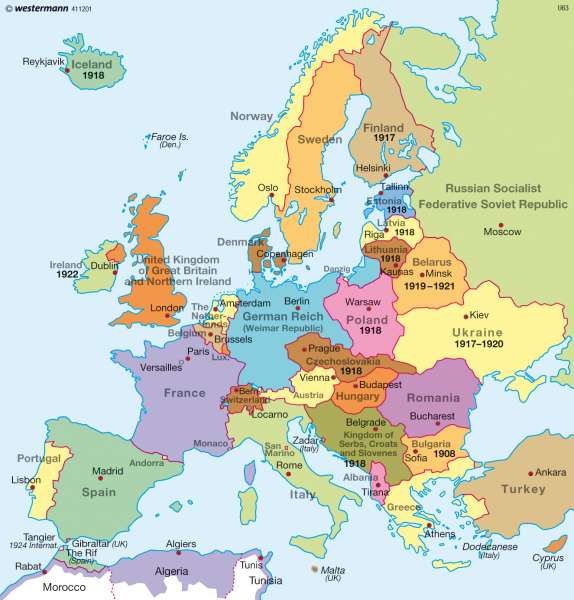Europe after World War One (1920/21)
Europe - Countries from 1914 to 1990
978-3-14-100790-9 | Page 36 | Ill. 2

Information
National boundaries in Europe were redrawn after the First World War. Germany was forced to relinquish territories under the terms of the Treaty of Versailles signed in 1919. The successor states of (German) Austria, which was forbidden to enter into an alliance with Germany, Hungary and Czechoslovakia, were carved from the territory of the Austro-Hungarian Dual Monarchy. Other parts of the Habsburg monarchy were ceded to Italy, Poland, Romania and the newly formed Kingdom of Serbs, Croats and Slovenes.A new balance of power
The Bolsheviks assumed power in Russia in 1917, and the nation was reconstituted as the Russian Socialist Federative Soviet Republic in 1918. The "Reds" won the civil war against the "Whites", who were supported by several foreign powers, but suffered territorial losses. Independence was short-lived in the Ukraine and Belarus. In 1918, the Republic was proclaimed in Poland, which had been united with Russia in a single kingdom since the Congress of Vienna. The former Russian Baltic provinces of Estonia, Latvia and Lithuania also declared their independence in 1918. Finland, once the Grand Duchy of the Russian Tsar, had become a sovereign state in 1917 and was proclaimed a republic in 1919.
While the borders of Portugal and Spain remained as they had been, Italy gained small territories in the North and East. Alsace-Lorraine was ceded to France. The independent Irish Republic was proclaimed in 1916 and became a free state after ceding the province of Ulster (Northern Ireland) to Great Britain in 1921. Iceland was recognized as a sovereign state under the Danish king in 1918.
The monarchies of the four major European powers, Germany, Austria-Hungary, Russia and the Ottoman Empire, were overthrown during or after the First World War. Yet the new and older nations were unable to achieve a lasting, stable political order. Smouldering territorial conflicts were compounded by boundary disputes, as the borders of such countries as Poland, Czechoslovakia and the Kingdom of Serbs, Croats and Slovenes had been drawn arbitrarily and without regard for ethnic distribution. The right of a people to self-determination articulated by U.S. President Woodrow Wilson was ignored in this case. Moreover, sanctions imposed by the Treaty of Versailles, which were regarded by nearly all political powers as excessive and unjust, fuelled the revanchist movement in Germany.
The League of Nations
Proposed by U.S. President Wilson, the League of Nations was established in 1919. It was an attempt to create an institution which would mediate conflicts between individual nations and bring them to peaceful resolution. The member states were obliged to develop disarmament plans and to respect the territorial integrity and political sovereignty of their fellow nations. The League was empowered to impose sanctions on member states which were guilty of military aggression. An arbitration process was established for the purpose of resolving international disputes. The organs of the League of Nations included commissioners for the territories administered by the League (Danzig, the Saarland), a Slavery Commission and the Permanent Court of International Justice in The Hague.
The most fundamental problem that plagued the League of Nations was the fact that the United States, which could have given it significantly greater weight, did not join. The League of Nations achieved some success in the field of humanitarian aid and managed to resolve several small European conflicts during the 1920s. Yet it failed in its efforts to preserve the territorial integrity of its member states and to maintain international peace in cases in which the interests of a major power (such as the U.S., Great Britain and the Soviet Union) were at stake. It was powerless to resist the aggressive foreign policies of Fascist Italy and Nazi Germany.
K. Lückemeier, E. Astor; Ü: J. Southard




